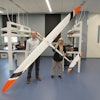
BOISE, Idaho (AP) — Tech startups have been migrating into cities all around the Mountain West, from Denver to Salt Lake to Boise.
However, when it comes to them taking over as the nation’s next Silicon Valley, Nick Crabbs, a partner at the tech startup Vynyl, has his doubts.
“We're not going to be the next Silicon Valley. It's not going to happen,” Crabbs, who works out of the software product firm’s Boise office, told the Mountain West News Bureau.
And for now, he’s right: the entire Mountain West got less than 3% of what California got in venture capital in 2018, according to the National Venture Capital Association.
But the Mountain West’s small tech sector is growing fast. Instead, he said the region should direct its energies elsewhere. It could shoot for people saying: “Boise, Idaho has gotten really cool, right? Bozeman, Montana has gotten really cool, and they have a flavor of this kind of growth there.”
Crabbs said Boise has come a long way in the last several years.
“I've gotten involved because I've also seen it when it's desolate for technology entrepreneurs here, right? Where there’s no services, there’s nothing to hook into, there’s no community,” he said.
But now Boise supports a bustling tech community with co-working spaces, a university business incubator and a massive yearly event called Boise Startup Week, where he’s a co-chair.
He said all of that is “a big reason why we're seeing the success we are.”
While some people move here for outdoor recreation or lower rent, he said entrepreneurs need something else: a supportive and interactive community. But to grow that community, you need a workforce, something the Mountain West has struggled with.
“The solution is more investment in education, and earlier in the pipeline,” he said.
Angela Hemingway agrees. She leads the Idaho STEM Action Center. It started in 2015 and is funded by state and private dollars to help Idaho students access a STEM education.
“Students, sometimes in K-12 may not even have awareness of opportunities that exist in their communities in Idaho or even the world as a whole,” she said.
On Jan. 15, she was at the Idaho Capitol event “STEM Matters,” which showed kids many of the cool ways to use science, technology, engineering and math. The kids checked out robots, virtual reality headsets and played games.
She said over the last two years, her group’s initiative to get more kids involved in computer science has been a success.
“We have seen an 11% increase in the number of teachers teaching computer science at the secondary level, so grades six through 12,” she said. “Corresponding, we have seen an 18% increase in the number of students taking computer science.”
But the news is not all good. There’s still a growing gap between available STEM jobs and people to fill them. She says there were 7,633 vacancies in Idaho last year — a 21% jump from the year before.
That’s partly because many residents interested in tech leave our region.
Tyler Lindholm, a Republican state representative living in Sundance, Wyoming, sees this as one of his state’s largest challenges.
“We invest a huge amount of money in every student,” he said.
He’s referring to the nearly $16,500 the state spends on each K-12 student per year, far above the national average. And then the state chips in to fund many Wyoming students’ college educations, giving full-ride scholarships to high performers or those in need.
“The problem is, is that not every one of those kids that goes through our education system wants to be a cowboy or coal miner when they grow up,” he said.
So Lindholm has been trying to capture some of the newest kinds of tech startups so kids have more options to stay: namely, those involving blockchain technology. That’s the stuff behind cryptocurrencies like Bitcoin.
The state has passed more than a dozen laws to entice blockchain businesses, and Lindholm intends to pass even more. He’s looking at other cutting-edge markets like artificial intelligence, too. After all, he said our region is used to exploring new frontiers.
“It wasn't Wall Street that won the West,” he said. “It was cowboys.”
Lindholm hopes his own kids want to stay in the cattle ranching business, but “if that's not for them and they wanted to work in the tech world, hopefully dad's efforts provided more opportunities.”
Back in Idaho, Nick Crabbs has helped expand Boise Startup Week to include college students from around the state. Specifically, they bus in computer science students, give them tokens to visit restaurants and show them what Boise has to offer.
“We put them in concerts and do all kinds of fun stuff with them. And then they go and meet all the technology employers here in Boise,” he said. “And the statistics from that are staggering. We're seeing like 30% of them who had not previously thought Boise was on the radar getting a job and moving here.”
He said it shows some of these entrepreneurs-to-be just how great their life could be if they stay in the Mountain West.






















